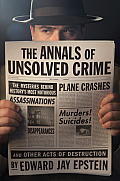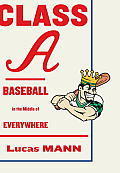Three New
(elsewhere, there’s this. A grasping review of a weird book)
This is a strange, compelling debut book. I’d be a sucker for it no matter what, given that it’s about baseball and the midwest—and now that I live in a town with a single A team, I’m especially susceptible to this, a chronicle of the 2010 season of the Clinton Lumber Jacks. Single-A baseball is a strange territory: its players are, of course, on the team they’re on, but their goal is to get the hell out of there and get to the bigs. So there’s tension, obviously: every player’s got at least one eye down the road, hoping. And then, in this book’s case, there’s Clinton, Iowa, a town which once had the most millionaires per capita, an old mill town on the Mississippi which has now been taken over by Archer Daniels Midland, a town which once provided the raw material with which the country would be built and now provides the raw material with which the country makes itself fat and diabetic.
And so Class A features these two odd tensions, one regarding nostalgia and what Clinton (and, by extension, the US) once was, and one regarding what these players (and, by extension, us) hope to become. It’s a strange book in this way: Mann’s an engaging guide (if his reach does at times exceed his grasp: there are scenes in which he’ll discuss playing baseball in his youth in the middle of some present tense consideration, and time gets all wobbly and the reader [at least this reader] may suddenly find himself scanning paragraphs, searching for a transition that isn’t there), but he’s ultimately writing about failure, about a town that knows precisely how far from its former glory it’s fallen and the impossibility of ever ascending to such heights again, and about baseball players, the bulk of whom will end up nada, washed away, flushed from the machinery of professional baseball for one of a thousand reasons as insignificant as injury or significant as kismet. It’s a book full of unquenched longing; it’s hard to read, hard to contend, page after page, with so much almost-but-not-quite, and yet you’ll be unable to stop. It’s a beautifully sad thing very well done.
 The Book of Barely Imagined Beings: a 21st Century Bestiary
by Caspar Henderson
The Book of Barely Imagined Beings: a 21st Century Bestiary
by Caspar Henderson
I don’t even know what to say about this book. Maybe the clearer and simpler the better: the book features twenty-seven animals (one for each letter but x, which gets two) that actually do exist and includes discursive, insanely smart and wide-ranging essays which (to this reader anyway) call to mind the best of Eliot Weinberger: you feel, on finishing one of these essays (for instance, the ‘H’ one, on humans), like there are windows in your mind that’ve been suddenly yanked open which you didn’t even realize had been closed. There are certainly plenty of reasons to read this book—it’s unbelievably gorgeous, for instance (it’s from U Chicago, which should tell you plenty), and the little moralistic aspects that end each essay are grounding and wise—but the primary reason is simply wonder: you will see the world differently on closing this book. You will be more amazed. I don’t know what else one should even think of asking for from a book.
 The Annals of Unsolved Crime by Edward Jay Epstein
The Annals of Unsolved Crime by Edward Jay Epstein
This is exactly what it says it is: a great book from Melville House by Epstein (who, for the record, is maybe the most fascinating writer I’d till now not heard of, a journalist whose first book—about the JFK assassination and the Warren Commission—was published when he was a graduate student at Cornell [he's The Man re: the JFK assassination, having written three books on it]) about unsolved crimes. The book’s split into five sections, each of which features chapters on unsolved crimes based on a sort of filing system, from the first section’s “Loners”: But Were They Alone?” which examines (among other things) Lincoln’s assassination and the Anthrax Attack to Part Five’s “Solved or Unsolved?” which considers the Oklahoma City bombing and “The Knox Ordeal,” (regarding Amanda Knox). There is also, not that surprisingly, an Epilogue on the JFK assassination and which is so assured and precise it’s breathtaking (and that he includes it, almost casually, as this epilogue…it’s the equivalent of name-your-favorite athlete pulling off some physically miraculous move with the ease with which mere mortals yawn or mow the lawn). In fact, Epstein is, every page, monumentally assured and precise: he pokes believable holes in all sorts of things (regarding the Zodiac killer, for instance, he claims—with a calm reasoning I find hard not to be seduced by, “Based on the lack of any matching evidence at the different crime scenes or in the letters, I assess that a single person could not have both attacked all the victims and written all the letters deemed authentic by the police.”). One’s confronted in The Annals of Unsolved Crimes with the shocking complexity involved in both the way crimes happen and the way they’re attempted to be solved (Epstein believes McVeigh and Nichols had help for the Oklahoma City bombing, but points out that the FBI wanted open-and-shut trials for the suspects they already had in custody—political expedience trumps the full extent of justice [which could be a chorus to lots of what Epstein examines]). It’s a fast and tremendously satisfying book, though one which makes questionless comfort with the larger governing structures we live with impossible.



 Class A by Lucas Mann
Class A by Lucas Mann

